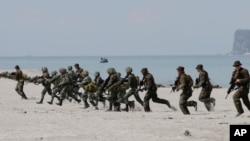Officials in the Philippines say reports that the Islamic State group is recruiting in the country have yet to be confirmed. But authorities remain vigilant because of concerns that certain segments of the population are at risk for falling under the terror group's influence.
An official with the Philippines Anti-Terrorism Council said several factors make the country particularly vulnerable to the pull of the Islamic State terrorist group.
Assistant Secretary Oscar Valenzuela said securing entry and exit points in waters off more remote southern provinces pose a challenge for the overstretched government, while social media have been a powerful tool to convey jihadist propaganda to young people. Plus, there are about two million Philippines nationals working overseas as contract workers near the conflict zone.
Filipinos overseas
"We have lots of Filipinos in the Middle East and of course we consider them one of the exposed sectors," said Valenzuela.
Valenzuela said the workers could be lured by the Islamic State group's wealth that comes partially from the oil refineries it took over in Iraq and Syria.
The Islamic State group's goal is to form a caliphate that follows an extremist interpretation of Islam. Media reports place membership between 30,000 and 80,000, including an unknown number of Westerners.
A handful of local officials at municipalities in the southern Philippines said Islamic State fighters are recruiting in their areas. However, both analysts and military officials said those reports have not been validated and they have no confirmation of the group's existence in the country.
Security officials on alert
General Joselito Kakilala said security officials are on alert for possible recruitment activities. He delivered a speech for the head of the Philippine Armed Forces at a Manila forum on radicalization. "If not systematically addressed, the said movement could well radicalize the extremist groups in the country and may further complicate the concerted efforts of the Philippine government to forge lasting peace and prosperity in Mindanao," he explained.
The southern island of Mindanao is home to a majority of the country's Muslims. In the spring, the largest Muslim rebel group - the Moro Islamic Liberation Front (MILF) - forged permanent peace with the government to end four decades of conflict.
But some smaller groups that at one point espoused separatist ideology are not backing the deal. These pose the country's main vulnerability to the Islamic State group's infiltration.
Mohagher Iqbal is the MILF lead peace negotiator. He said they have no interest in engaging the Islamic State group. Besides, he thinks any Islamic State recruitment in the Philippines would be impractical.
"Even in terms of logistics, it's very difficult to send people to Syria and Baghdad. It's better for them to use that money [for] buying ammunition rather than to spend for people going to Syria and Baghdad," Iqbal stated.
Abu Sayyaf Group
In July the Abu Sayyaf Group posted a video pledging allegiance to the Islamic State movement. The ASG is a splinter group of a larger Muslim rebel group. It started in the 1990s with funding from al-Qaida, but in the last dozen years it has devolved into a kidnap for ransom gang notorious for beheadings and bombings.
The Abu Sayyaf announced it would behead a captive German national this month if Germany continued to support the U.S. bombing campaign.
Germany's involvement is limited to sending weapons and military equipment to the Kurdish government.
The Bangsamoro Islamic Freedom Fighters, who broke away from the MILF, said last month they pledged allegiance to the Islamic State group.
Philippine Institute for Peace, Violence and Terrorism Research analyst Rommel Banlaoi said there are three ways extremists can align themselves with the fighters who call themselves the Islamic State: direct links or communication, inspiration with no direct contact or capitalizing on their notoriety.
"We should not deny the presence of ISIS [the former name of the group] in the Philippines. Their presence is alive through the three categories I have mentioned," he said.
Banlaoi theorizes that a tiny group of fewer than two dozen people called the Khilafa Islamiyah Mindanao poses the strongest possibility of sympathizing with the Islamic State fighters. Khilafa allegedly declared its intent to form a caliphate in the southern Philippines two years ago.
While authorities investigate reports of the IS group's presence, the Anti-Terrorism Council official, Oscar Valenzuela said the Bureau of Immigrations has tightened arrival and departure procedures. The head of the immigration bureau say the Philippines already attracts fugitives, and in recent months the government arrested and deported an Australian and a Canadian who were wanted abroad for allegedly preaching extremist jihadist ideology.









